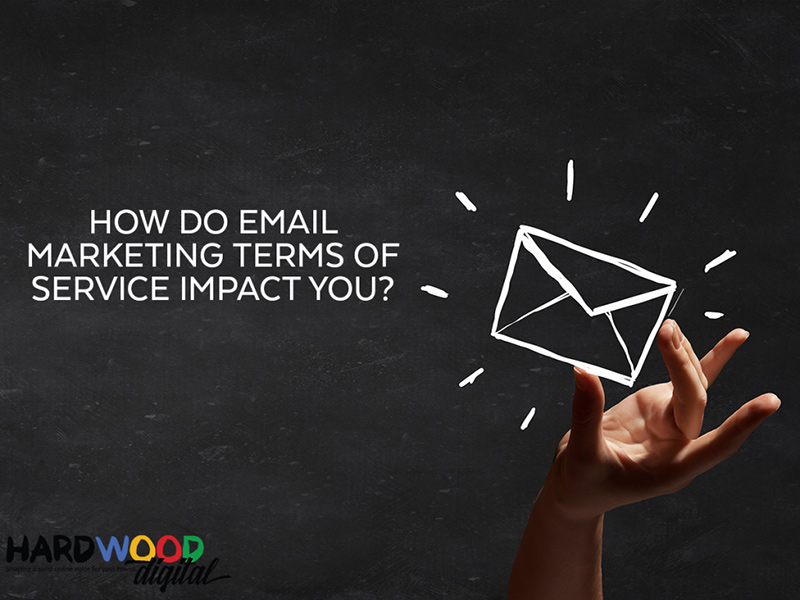MailChimp are a great entry point for building your email marketing database. It’s free for your first 2000 subscribers, it’s easy to use and you can add automation features for a small monthly cost. It’s also been a hot topic of conversation amongst bloggers and businesses in the last week.
Here’s an explanation of how the terms of service for MailChimp (and other email providers) might be affecting you.
As for any product or service you rely on to manage your business it’s essential that you understand the terms of service. Getting caught out using a service in a way that it was not intended to be use can lead to you no longer being able to use that service and may also have implications on how your personal IP address is viewed.
However, provided that you aren’t setting out to do anything shady you most likely don’t need to worry too much about getting shut down.
In recent weeks MailChimp have possibly updated their acceptable use terms of service, sparking some discussion about what is and isn’t allowable.
Specifically we’ve seen significant discussion around affiliate marketing and multi-level marketing.
Without investigating every email marketing service out there it’s apparent that use by network marketing (MLM) businesses is considered to be inappropriate use. From MailChimp to Active Campaign (which we use) right through to Infusionsoft.
We aren’t involved with MLM business so consequently we aren’t sure if this is a new thing or if it’s recently become a hot topic of discussion. It’s also important to recognise that promotion of pharmaceuticals and dietary supplements is also deemed inappropriate use, many dietary supplements sit under a MLM umbrella, and consequently using one of these email marketing tools is a double no-no.
How about affiliate marketing?
What does this mean for bloggers and businesses who promote products and services and earn an income from affiliate sales?
Affiliate links fall into more than one category and using bad affiliate links will land you in the bad books. However, it is fine to link to different products and services in your email campaigns with affiliate links. Make sure that you are using your own voice, not an advertisement provided to you by another company.
Using your own voice and branding prevents confusion about who the email has come from.
What’s not okay here is buying a list and emailing random affiliate links with the sole purpose of generating commission.
To put it in MailChimp’s terms:
If you’re an author or professional blogger or business owner that sends permission-based emails full of content that your recipients are expecting, and the content isn’t prohibited under our Terms of Use, and you don’t violate any spam laws, you will likely never experience any problems using MailChimp, even if you include affiliate marketing links. If you’re someone who calls yourself an affiliate marketer whose content is strictly to gain a commission, MailChimp isn’t for you.
It’s pretty clear really, if you aren’t doing anything dodgy then you are sweet.
However, there is one more thing that you should consider with regards to preventing spam complaints. That is how you build your list in the first place.
Use the double opt in.
As much of a pain in the backside as it might seem using a double opt in is considered to be best practice. A double opt is where someone needs to confirm their subscription by clicking a link in an email sent to them after they filled in the online form.
Ultimately the double opt in leaves you with a higher quality list because people have shown more commitment to signing up in the first place. It also ensures that you have proof that each person signed up to your list and gave you permission to send them emails.
It’s not ideal to add people to your list from business cards you have collected at an event but provided that you asked the person when you took their card some most will still have the opportunity to confirm the subscription after you enter their details in your database.
If you are an online product based business ensure that you allow customers to opt in to your mailing list, them buying something doesn’t specifically translate to them wanting to be on your regular mailing list.
Last but not least, an important aspect of maintaining a list who don’t report you as spam is to stay in contact with them. If you collect email addresses then wait for ages to email them then that list is likely to go stale. Consistent email marketing is a really important element of achieving growth….however, sometimes we don’t manage to pull of our intentions and things don’t quite work out the way we planned.
If you do find yourself in the situation of needing to re-engage your list 12 months or more after last emailing them, explain your intention going forward and give them a really easy option to unsubscribe if they no longer want your emails.
Don’t get offended when people do unsubscribe, never ever email them and ask them why. The average person gets in excess of 140 emails each day and we all manage them differently. This is why even though your email list is likely to be your key money maker providing good content elsewhere across the internet is also really important because this will help to keep your open rates high and capture the attention of people who are unlikely to engage with you via email.
Does this clear up what is and isn’t allowable for you?
If you haven’t been utilising email marketing yet in your business then it is time to get on board. Join Tatum for one of her upcoming email marketing workshops or book in for a free strategy session to discuss what would work for you.
You can read more about MailChimp’s Terms of Service, Acceptable Use and Use of Affiliate Links on their website.


